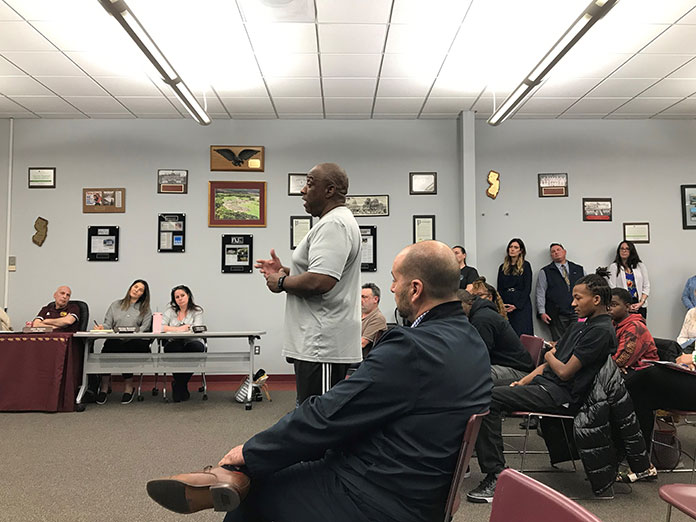
BERKELEY – A Central Regional Board of Education member’s social media posts are being called racist by members of the public who came out to a recent meeting asking for her to be punished. The board member said that the posts were taken out of context.
Heather Koenig joined the board in January as a representative from Berkeley. Her posts were memes – pictures with text on them that she shared from other accounts. Of the three that were shown to The Berkeley Times, only one had her own words. “Sorry but not sorry” was written when the image was shared. This one showed a Black man complaining about the Jan. 6 insurrection attempt using slang. Another post compared a veteran’s struggle to an athlete’s bad behavior with a tag line “Stop making stupid people famous.” And the third attempted to call out what critics say is the hypocrisy of Black Lives Matter.
Residents and local leaders came out to speak about how those posts made them feel.
Will Jacobs is a Central teacher as well as a graduate. He said he remembered fights breaking out because of race when he was a student. When he got his teaching certificate, people asked why he would go back to Central. He said it was important for students of all races to see a Black teacher.
But now that he sees what a board member really thinks, he worries about his job.
Joseph Provenzano said he’s a recent Central graduate. When he was in the JROTC and football team, “we were always taught to do better.”
He acknowledged that Koenig has a 1st Amendment right to post whatever she wants, “but when you’re in the public eye, you’ve got to do better.”
Pastor Donnie Clyburn said that schools are places for people to learn not only about subject matter but about each other as well.
“I don’t understand every culture, but I know right and wrong,” he said. “That’s not culture; that’s character.”
Bahiyyah Abdullah, president of the Toms River area NAACP, said that students need to feel safe and secure in order to succeed. They can’t do that if someone in charge of their education is acting in this way. She asked the board to take disciplinary actions against Koenig.
During the meeting, the board passed a resolution recognizing the requirements of the Workplace Democracy Act. The important points in this act is that “no individual or member does or should be considered to speak for the board.”
The resolution states that “no one person can speak for the Board of Education and any official statements can be made by the Board of Education through the appropriate channels and consistent with Board policy and bylaws.”
The resolution went on to say the Board “disavows any statements posted or attributed by any individual” that conflicts with the Workplace Democracy Act and the code of ethics.
This was not enough for some members of the public, who wanted more of a response from the district.
Robert Taylor, who runs a lot of youth programs for the Manitou Park section of town, said having a person of authority make these statements hurts the cause of unity.
“There was a time, if you weren’t a certain color, you couldn’t go into Manitou Park,” he said. Things need to keep going in a positive direction.
“I’m embarrassed for Central,” he said, noting that the situation is being talked about throughout the state. “All I see is a little apology to cover it up.”
After the meeting, Koenig spoke to The Berkeley Times, but made sure that the board’s attorney was there.
“There’s always two sides to a story,” she said. “Only one side is being taken. Something was taken out of context.”
Superintendent Triantafillos Parlapanides said he didn’t want one or two opinions to be reflective of the whole board. The district staff work to give every child an equal opportunity. However, because it’s a personnel issue, he can’t share what the board does behind the scenes in a case like this.
He suggested starting a committee of volunteers made up of community leaders to talk about how to handle race issues.





